UNIT 2Natural disasters 分层跟踪检测(2)Grammar and usage & Integrated skills--2025译林版高中英语必修第三册同步练习题(含答案与解析
文档属性
| 名称 | UNIT 2Natural disasters 分层跟踪检测(2)Grammar and usage & Integrated skills--2025译林版高中英语必修第三册同步练习题(含答案与解析 |
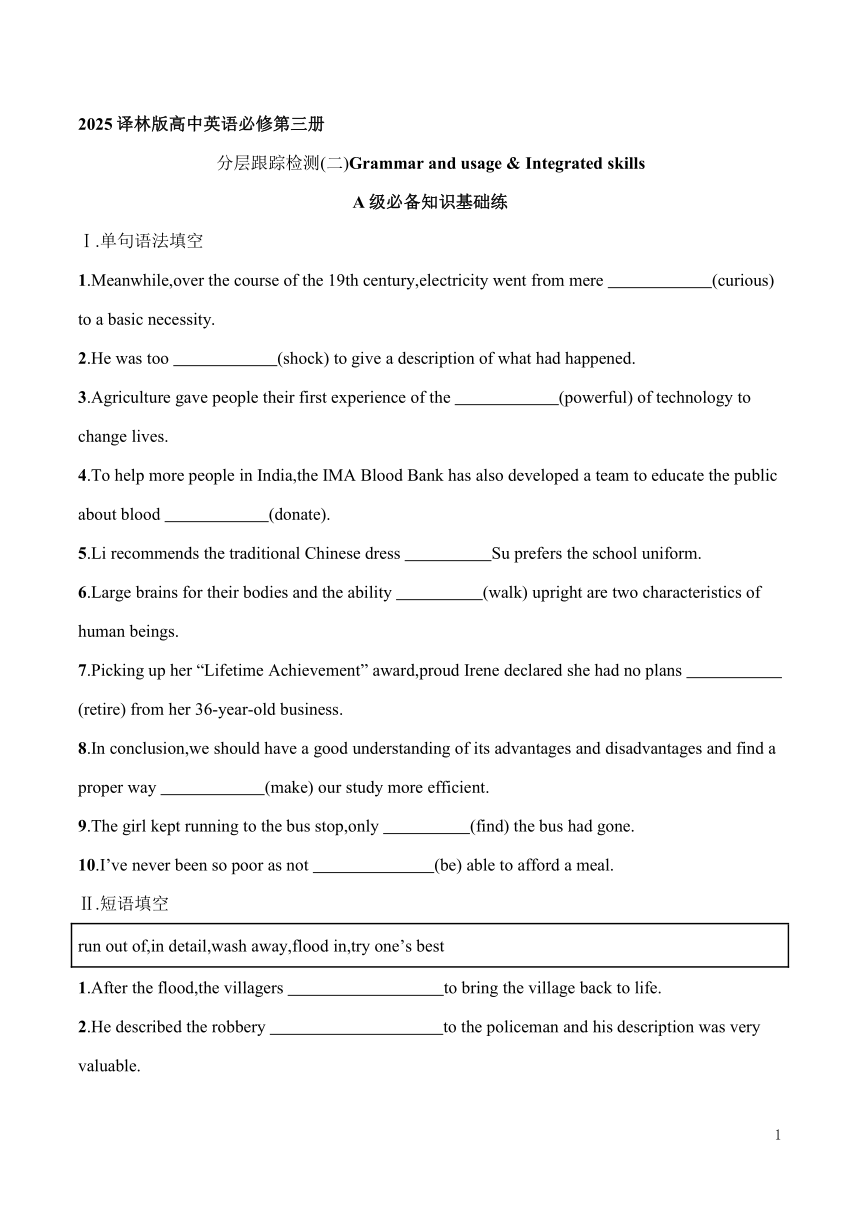
|
|
| 格式 | docx | ||
| 文件大小 | 42.8KB | ||
| 资源类型 | 试卷 | ||
| 版本资源 | 牛津译林版(2019) | ||
| 科目 | 英语 | ||
| 更新时间 | 2025-06-16 00:00:00 | ||
图片预览

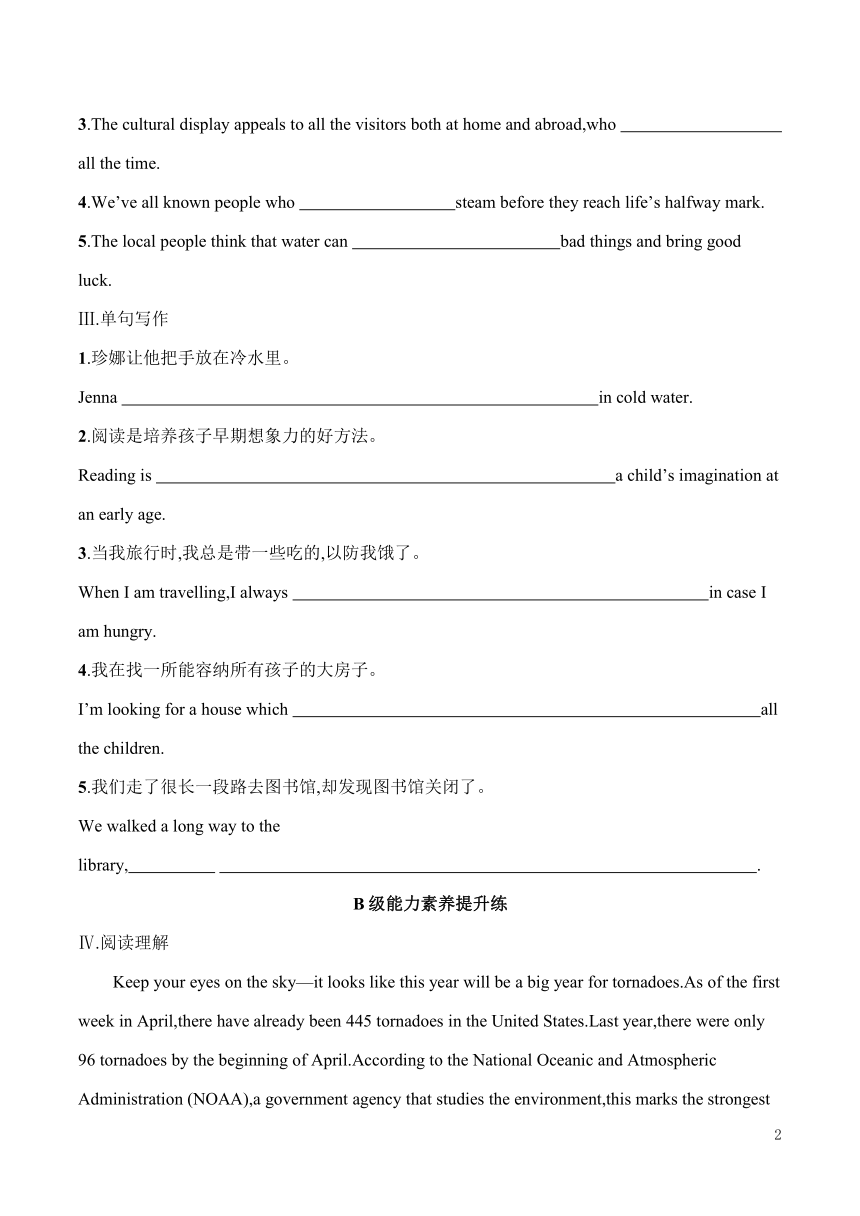
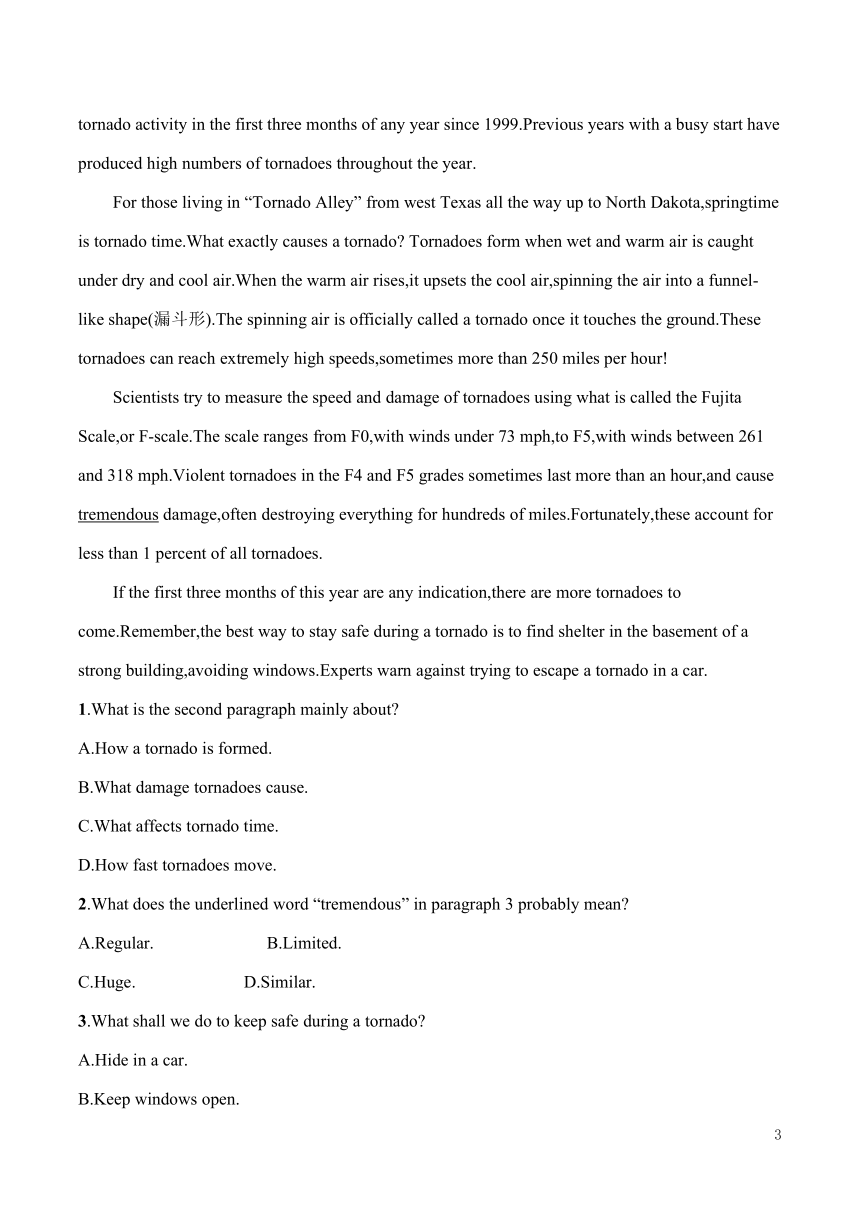
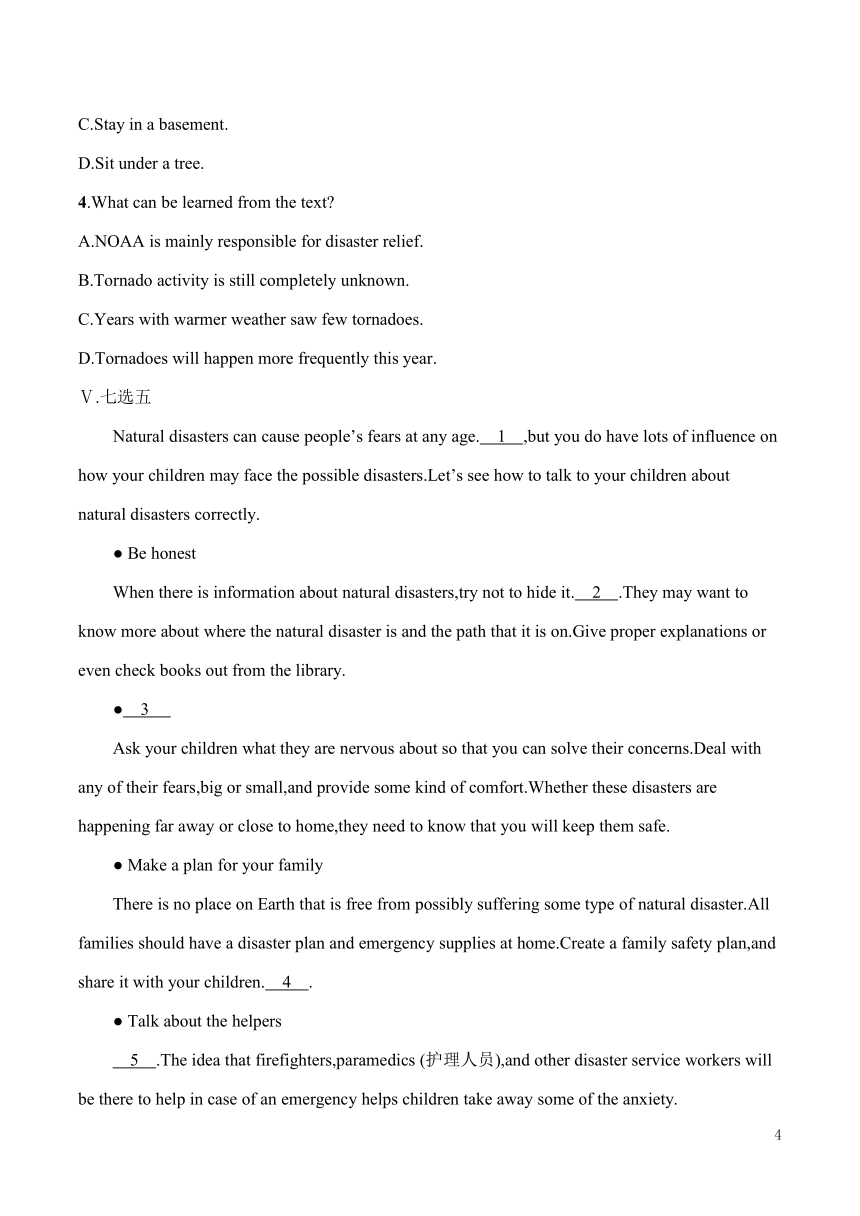
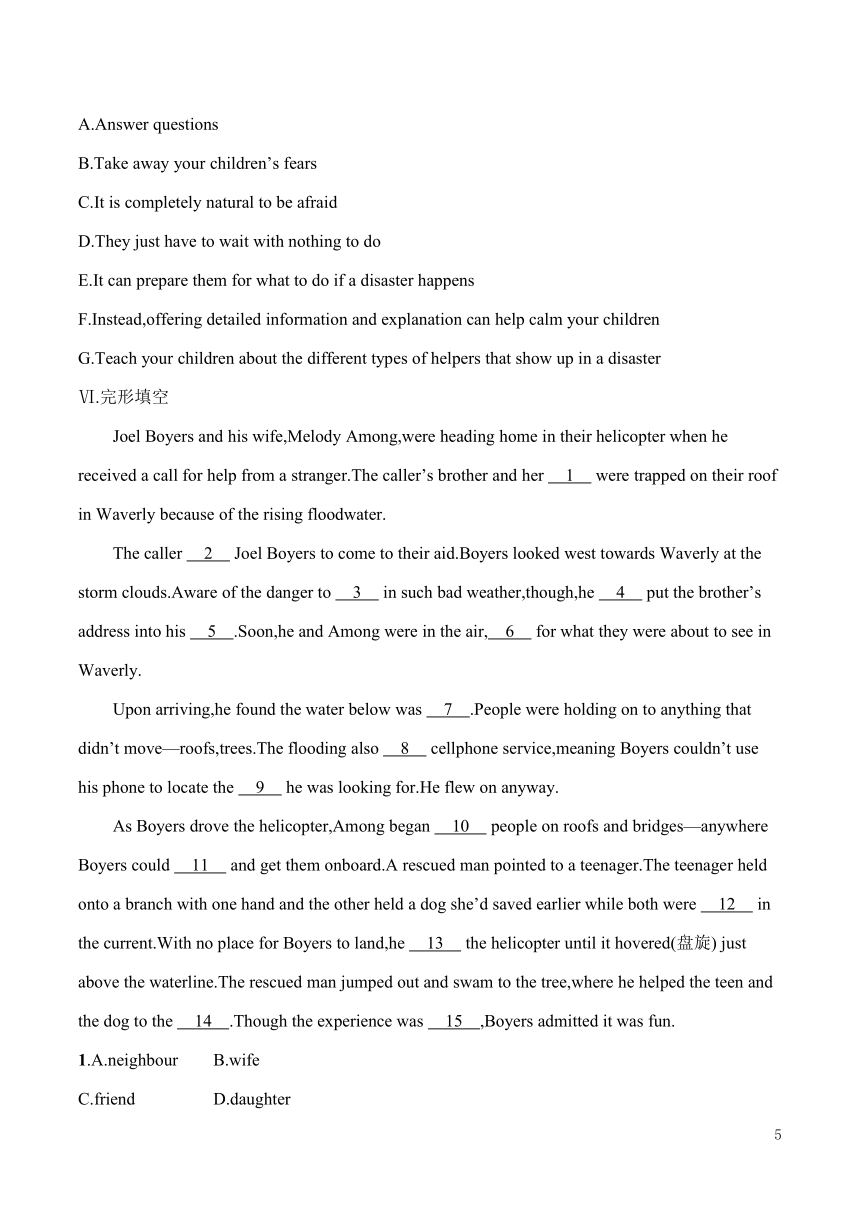
文档简介
2025译林版高中英语必修第三册
分层跟踪检测(二)Grammar and usage & Integrated skills
A级必备知识基础练
Ⅰ.单句语法填空
1.Meanwhile,over the course of the 19th century,electricity went from mere (curious) to a basic necessity.
2.He was too (shock) to give a description of what had happened.
3.Agriculture gave people their first experience of the (powerful) of technology to change lives.
4.To help more people in India,the IMA Blood Bank has also developed a team to educate the public about blood (donate).
5.Li recommends the traditional Chinese dress Su prefers the school uniform.
6.Large brains for their bodies and the ability (walk) upright are two characteristics of human beings.
7.Picking up her “Lifetime Achievement” award,proud Irene declared she had no plans (retire) from her 36-year-old business.
8.In conclusion,we should have a good understanding of its advantages and disadvantages and find a proper way (make) our study more efficient.
9.The girl kept running to the bus stop,only (find) the bus had gone.
10.I’ve never been so poor as not (be) able to afford a meal.
Ⅱ.短语填空
run out of,in detail,wash away,flood in,try one’s best
1.After the flood,the villagers to bring the village back to life.
2.He described the robbery to the policeman and his description was very valuable.
3.The cultural display appeals to all the visitors both at home and abroad,who all the time.
4.We’ve all known people who steam before they reach life’s halfway mark.
5.The local people think that water can bad things and bring good luck.
Ⅲ.单句写作
1.珍娜让他把手放在冷水里。
Jenna in cold water.
2.阅读是培养孩子早期想象力的好方法。
Reading is a child’s imagination at an early age.
3.当我旅行时,我总是带一些吃的,以防我饿了。
When I am travelling,I always in case I am hungry.
4.我在找一所能容纳所有孩子的大房子。
I’m looking for a house which all the children.
5.我们走了很长一段路去图书馆,却发现图书馆关闭了。
We walked a long way to the library, .
B级能力素养提升练
Ⅳ.阅读理解
Keep your eyes on the sky—it looks like this year will be a big year for tornadoes.As of the first week in April,there have already been 445 tornadoes in the United States.Last year,there were only 96 tornadoes by the beginning of April.According to the National Oceanic and Atmospheric Administration (NOAA),a government agency that studies the environment,this marks the strongest tornado activity in the first three months of any year since 1999.Previous years with a busy start have produced high numbers of tornadoes throughout the year.
For those living in “Tornado Alley” from west Texas all the way up to North Dakota,springtime is tornado time.What exactly causes a tornado Tornadoes form when wet and warm air is caught under dry and cool air.When the warm air rises,it upsets the cool air,spinning the air into a funnel-like shape(漏斗形).The spinning air is officially called a tornado once it touches the ground.These tornadoes can reach extremely high speeds,sometimes more than 250 miles per hour!
Scientists try to measure the speed and damage of tornadoes using what is called the Fujita Scale,or F-scale.The scale ranges from F0,with winds under 73 mph,to F5,with winds between 261 and 318 mph.Violent tornadoes in the F4 and F5 grades sometimes last more than an hour,and cause tremendous damage,often destroying everything for hundreds of miles.Fortunately,these account for less than 1 percent of all tornadoes.
If the first three months of this year are any indication,there are more tornadoes to come.Remember,the best way to stay safe during a tornado is to find shelter in the basement of a strong building,avoiding windows.Experts warn against trying to escape a tornado in a car.
1.What is the second paragraph mainly about
A.How a tornado is formed.
B.What damage tornadoes cause.
C.What affects tornado time.
D.How fast tornadoes move.
2.What does the underlined word “tremendous” in paragraph 3 probably mean
A.Regular. B.Limited.
C.Huge. D.Similar.
3.What shall we do to keep safe during a tornado
A.Hide in a car.
B.Keep windows open.
C.Stay in a basement.
D.Sit under a tree.
4.What can be learned from the text
A.NOAA is mainly responsible for disaster relief.
B.Tornado activity is still completely unknown.
C.Years with warmer weather saw few tornadoes.
D.Tornadoes will happen more frequently this year.
Ⅴ.七选五
Natural disasters can cause people’s fears at any age. 1 ,but you do have lots of influence on how your children may face the possible disasters.Let’s see how to talk to your children about natural disasters correctly.
● Be honest
When there is information about natural disasters,try not to hide it. 2 .They may want to know more about where the natural disaster is and the path that it is on.Give proper explanations or even check books out from the library.
● 3
Ask your children what they are nervous about so that you can solve their concerns.Deal with any of their fears,big or small,and provide some kind of comfort.Whether these disasters are happening far away or close to home,they need to know that you will keep them safe.
● Make a plan for your family
There is no place on Earth that is free from possibly suffering some type of natural disaster.All families should have a disaster plan and emergency supplies at home.Create a family safety plan,and share it with your children. 4 .
● Talk about the helpers
5 .The idea that firefighters,paramedics (护理人员),and other disaster service workers will be there to help in case of an emergency helps children take away some of the anxiety.
A.Answer questions
B.Take away your children’s fears
C.It is completely natural to be afraid
D.They just have to wait with nothing to do
E.It can prepare them for what to do if a disaster happens
F.Instead,offering detailed information and explanation can help calm your children
G.Teach your children about the different types of helpers that show up in a disaster
Ⅵ.完形填空
Joel Boyers and his wife,Melody Among,were heading home in their helicopter when he received a call for help from a stranger.The caller’s brother and her 1 were trapped on their roof in Waverly because of the rising floodwater.
The caller 2 Joel Boyers to come to their aid.Boyers looked west towards Waverly at the storm clouds.Aware of the danger to 3 in such bad weather,though,he 4 put the brother’s address into his 5 .Soon,he and Among were in the air, 6 for what they were about to see in Waverly.
Upon arriving,he found the water below was 7 .People were holding on to anything that didn’t move—roofs,trees.The flooding also 8 cellphone service,meaning Boyers couldn’t use his phone to locate the 9 he was looking for.He flew on anyway.
As Boyers drove the helicopter,Among began 10 people on roofs and bridges—anywhere Boyers could 11 and get them onboard.A rescued man pointed to a teenager.The teenager held onto a branch with one hand and the other held a dog she’d saved earlier while both were 12 in the current.With no place for Boyers to land,he 13 the helicopter until it hovered(盘旋) just above the waterline.The rescued man jumped out and swam to the tree,where he helped the teen and the dog to the 14 .Though the experience was 15 ,Boyers admitted it was fun.
1.A.neighbour B.wife
C.friend D.daughter
2.A.ordered B.attracted
C.begged D.challenged
3.A.pack B.fly
C.quit D.swim
4.A.immediately B.secretly
C.gradually D.creatively
5.A.card B.pocket
C.computer D.phone
6.A.unprepared B.intended
C.relieved D.recognized
7.A.peaceful B.rapid
C.familiar D.clean
8.A.revised B.delivered
C.damaged D.registered
9.A.house B.tree
C.car D.bridge
10.A.debating with B.adapting to
C.commenting on D.searching for
11.A.land B.rise
C.jump D.look
12.A.training B.exploring
C.experimenting D.struggling
13.A.reserved B.lowered
C.followed D.designed
14.A.home B.school
C.helicopter D.truck
15.A.plain B.awkward
C.adventurous D.formal
Ⅶ.语法填空
The terrifying flooding of Venice could and should have been avoided.It hasn’t been this bad since 1966,when the water reached 6 feet,4 inches.Back then,1. (frighten) Italians called for immediate action.2. ,once the water moved away,they didn’t take it as seriously as before.The massive MOSE flood 3. (protect) system that was finally approved in 2003 still hasn’t been completed.
“Meanwhile,Venice is disappearing beneath the water,” said Jacopo Giliberto.“Climate change and rising sea levels are 4. (blame).But so is the fact that we pumped water from an underground aquifer(蓄水层) 5. the 1930s to the 1980s,6. (cause) the ground beneath us to fall with impressive speeds.Proud Venice is 7. world treasure,an open-air art museum,so officials instead chose more expensive invisible dams that won’t disturb the view.So far,we 8. (spend) more than $6 billion on MOSE,which won’t be put into use until next year at the earliest.”
“The project is a disaster,and Italians just aren’t good at long-term planning,” said Maurizio Ferrera.“Look at our booming national debt,9. now sits at $2.7 trillion,138 percent of our GDP.If we are to save Venice,we’ll have to change our political culture.10. is unclear whether we have the will.”
UNIT 2
分层跟踪检测(二)Grammar and usage & Integrated skills
Ⅰ.1.curiosity 2.shocked 3.power 4.donation 5.while 6.to walk 7.to retire 8.to make 9.to find 10.to be
Ⅱ.1.tried their best 2.in detail 3.flood in 4.run out of 5.wash away
Ⅲ.1.made him put his hand 2.a good way to develop 3.take something to eat 4.is big enough to hold 5.only to find that it was closed
Ⅳ.【语篇导读】本文是一篇说明文。文章讲述了龙卷风的形成、特点及遇到龙卷风时应采取的措施。
1.A 段落大意题。根据第二段中“What exactly causes a tornado ”可推断,本段主要讲述龙卷风的形成原因。故选A项。
2.C 词义猜测题。根据第三段中“Violent tornadoes in the F4 and F5 grades sometimes last more than an hour”以及“often destroying everything for hundreds of miles”可知,F4及F5级龙卷风很猛烈,持续时间长,能摧毁数百英里内的一切,因此,它的破坏力是非常巨大的。tremendous巨大的。故选C项。
3.C 细节理解题。根据最后一段中“Remember,the best way to stay safe...escape a tornado in a car.”可知,面对龙卷风时,专家建议到地下室去,远离窗口,不要乘坐汽车。故选C项。
4.D 推理判断题。根据最后一段第一句可知,如果今年前三个月有什么预兆的话,那就是更多的龙卷风即将来临。由此可推断,今年前三个月,会有更多的龙卷风来临。故选D项。
Ⅴ.【语篇导读】本文是一篇说明文。文章主要介绍的是如何和孩子谈论自然灾害让孩子正确地面对。
1.C 根据空前的“Natural disasters can cause people’s fears at any age.”可知,任何年龄段的人对自然灾害都有恐惧,结合空后的“but you do have lots of influence on how your children may face the possible disasters”可知,成人对孩子如何认识灾难方面有很大的影响,与此空为转折关系,由此可知,此空应是承接上文,且与空后内容为转折关系,C选项“It is completely natural to be afraid”讲述的内容承接上文讲述的“任何年龄段的人对自然灾害都会感到恐惧”,且与空后的内容为转折关系,符合语境。故选C项。
2.F 根据空前的“When there is information about natural disasters,try not to hide it.”可知,出现自然灾难的信息时不要去逃避,结合空后的“They may want to know more about where the natural disaster is and the path that it is on.”可知,孩子们可能想知道更多关于自然灾害的情况,由此可知,此空应涉及出现自然灾害时应如何处理,F选项“Instead,offering detailed information and explanation can help calm your children”说明给孩子讲自然灾难的信息和解释对孩子有帮助,与空前内容为转折关系,其中Instead为关键信息,且空后的They指的是F选项中的your children。故选F项。
3.B 分析语篇可知,此处为本段的主题句,结合其他段落的主题句可知,此处应为祈使句,根据下文的“Ask your children what they are nervous about so that you can solve their concerns.”可知,本段主要讲述的是如何做帮助孩子战胜恐惧,B选项“Take away your children’s fears”讲述的内容符合本段的内容,且概括了本段的主题。故选B项。
4.E 根据本段的主题句“Make a plan for your family”可知,本段主要讲述的是为家庭制订一个计划,结合空前的“Create a family safety plan,and share it with your children.”可知,制订一个家庭安全计划,并且与孩子分享,由此可知,此空应进一步讲述这样做的结果是什么,E选项“It can prepare them for what to do if a disaster happens”讲述的内容进一步对空前内容做出解释,其中的it指代的为空前提到的制订的家庭安全计划,符合语境。故选E项。
5.G 根据本段的主题句“Talk about the helpers”可知,本段讲述的是与孩子讨论一下救援者的相关情况,G选项“Teach your children about the different types of helpers that show up in a disaster”中涉及了救援者的相关情况,其中的helpers为词汇复现,且与本段讲述的内容及空后提到的救援者的相关信息相符,符合语境。故选G项。
Ⅵ.【语篇导读】本文是一篇记叙文。文章主要讲述了Joel Boyers和他的妻子Melody Among不顾危险,驾驶直升机抢救被洪水围困的人的故事。
1.D 根据上文“The caller’s brother”和下文“The teenager”可知,打电话者的弟弟和她的女儿由于上涨的洪水被困在韦弗利的屋顶。故选D项。
2.C 根据上文“trapped on their roof in Waverly because of the rising floodwater”可知,他们被困在屋顶,因此是恳求Joel Boyers来营救他们。故选C项。
3.B 根据上文“heading home in their helicopter”可知,他们乘坐直升机回家,因此在如此恶劣条件下飞行是很危险的。故选B项。
4.A 根据上文“Boyers looked west towards Waverly at the storm clouds.”可知,当时乌云密布,情况紧急,因此他立即将求救者弟弟的地址输入手机。故选A项。
5.D 根据下文“Boyers couldn’t use his phone to locate”可知,Boyers不能使用他的手机去定位,由此可知,他将求救者弟弟的地址输入手机。故选D项。
6.A 根据上文“Soon,he and Among were in the air”可知,他们很匆忙,还没有准备好会在韦弗利将会看到什么。故选A项。
7.B 根据下文“People were holding on to anything that didn’t move—roofs,trees.”可知,人们紧紧地抓住不能移动的任何东西,由此可知,水流很急。故选B项。
8.C 根据下文“meaning Boyers couldn’t use his phone to locate”可知,Boyers不能定位到他寻找的房子,因此洪水也破坏了手机服务。故选C项。
9.A 根据上文“were trapped on their roof”可知,他们被困在屋顶,因此Boyers寻找他们所在的房子。故选A项。
10.D debate with与……争论;adapt to适应;comment on评论;search for搜寻。根据上文“were trapped on their roof”可知,他们被困在屋顶,因此Boyers和Among在搜寻他们。故选D项。
11.A 根据下文“get them onboard”可知,要让求救者上来,他必须找到着陆的地方。故选A项。
12.D 根据上文“The teenager held onto a branch with one hand and the other held a dog she’d saved earlier”可知,被困洪水中,两者在水里挣扎。故选D项。
13.B 根据下文“until it hovered just above the waterline”可知,由于找不到着陆的地方,他就降低直升机到水面线上。故选B项。
14.C 根据上文“the helicopter until it hovered just above the waterline”可知,他们是被直升机救了。故选C项。
15.C 根据上文“Aware of the danger to”可知,这是一次危险的救人经历。故选C项。
Ⅶ.【语篇导读】本文是一篇说明文。文章主要介绍了威尼斯现在面临的问题——洪水泛滥和地下水快速消失。
1.frightened 考查形容词。修饰人,表示“受到惊吓的”应用frightened作定语。故填frightened。
2.However/Nevertheless 考查副词。结合上文“意大利人被吓到”和此处“不再认真对待这个问题”可知,上下文之间是转折意义,应用however/nevertheless连接,单词位于句首,首字母大写。故填However/Nevertheless。
3.protection 考查名词。分析可知,空处应用名词作定语。故填protection。
4.to blame 考查固定搭配。固定搭配be to blame表“应受责备”。故填to blame。
5.from 考查介词。from...to...从……到……。故填from。
6.causing 考查非谓语动词。空处作状语,表示自然而然的结果应用动词-ing形式。故填causing。
7.a 考查冠词。treasure“珍宝”是可数名词,此处是泛指,应用不定冠词修饰,又因为world的发音是辅音音素开头,应用a。故填a。
8.have spent 考查动词的时态和主谓一致。空处为主句谓语动词,结合语境和时间状语So far判断,此处应为现在完成时;主语是复数,助动词用have。故填have spent。
9.which 考查定语从句。空处引导非限制性定语从句,应用关系代词which引导。故填which。
10.It 考查代词。分析可知,whether引导的句子作主语,故空处填it作形式主语,单词位于句首,首字母大写。故填It。
8
分层跟踪检测(二)Grammar and usage & Integrated skills
A级必备知识基础练
Ⅰ.单句语法填空
1.Meanwhile,over the course of the 19th century,electricity went from mere (curious) to a basic necessity.
2.He was too (shock) to give a description of what had happened.
3.Agriculture gave people their first experience of the (powerful) of technology to change lives.
4.To help more people in India,the IMA Blood Bank has also developed a team to educate the public about blood (donate).
5.Li recommends the traditional Chinese dress Su prefers the school uniform.
6.Large brains for their bodies and the ability (walk) upright are two characteristics of human beings.
7.Picking up her “Lifetime Achievement” award,proud Irene declared she had no plans (retire) from her 36-year-old business.
8.In conclusion,we should have a good understanding of its advantages and disadvantages and find a proper way (make) our study more efficient.
9.The girl kept running to the bus stop,only (find) the bus had gone.
10.I’ve never been so poor as not (be) able to afford a meal.
Ⅱ.短语填空
run out of,in detail,wash away,flood in,try one’s best
1.After the flood,the villagers to bring the village back to life.
2.He described the robbery to the policeman and his description was very valuable.
3.The cultural display appeals to all the visitors both at home and abroad,who all the time.
4.We’ve all known people who steam before they reach life’s halfway mark.
5.The local people think that water can bad things and bring good luck.
Ⅲ.单句写作
1.珍娜让他把手放在冷水里。
Jenna in cold water.
2.阅读是培养孩子早期想象力的好方法。
Reading is a child’s imagination at an early age.
3.当我旅行时,我总是带一些吃的,以防我饿了。
When I am travelling,I always in case I am hungry.
4.我在找一所能容纳所有孩子的大房子。
I’m looking for a house which all the children.
5.我们走了很长一段路去图书馆,却发现图书馆关闭了。
We walked a long way to the library, .
B级能力素养提升练
Ⅳ.阅读理解
Keep your eyes on the sky—it looks like this year will be a big year for tornadoes.As of the first week in April,there have already been 445 tornadoes in the United States.Last year,there were only 96 tornadoes by the beginning of April.According to the National Oceanic and Atmospheric Administration (NOAA),a government agency that studies the environment,this marks the strongest tornado activity in the first three months of any year since 1999.Previous years with a busy start have produced high numbers of tornadoes throughout the year.
For those living in “Tornado Alley” from west Texas all the way up to North Dakota,springtime is tornado time.What exactly causes a tornado Tornadoes form when wet and warm air is caught under dry and cool air.When the warm air rises,it upsets the cool air,spinning the air into a funnel-like shape(漏斗形).The spinning air is officially called a tornado once it touches the ground.These tornadoes can reach extremely high speeds,sometimes more than 250 miles per hour!
Scientists try to measure the speed and damage of tornadoes using what is called the Fujita Scale,or F-scale.The scale ranges from F0,with winds under 73 mph,to F5,with winds between 261 and 318 mph.Violent tornadoes in the F4 and F5 grades sometimes last more than an hour,and cause tremendous damage,often destroying everything for hundreds of miles.Fortunately,these account for less than 1 percent of all tornadoes.
If the first three months of this year are any indication,there are more tornadoes to come.Remember,the best way to stay safe during a tornado is to find shelter in the basement of a strong building,avoiding windows.Experts warn against trying to escape a tornado in a car.
1.What is the second paragraph mainly about
A.How a tornado is formed.
B.What damage tornadoes cause.
C.What affects tornado time.
D.How fast tornadoes move.
2.What does the underlined word “tremendous” in paragraph 3 probably mean
A.Regular. B.Limited.
C.Huge. D.Similar.
3.What shall we do to keep safe during a tornado
A.Hide in a car.
B.Keep windows open.
C.Stay in a basement.
D.Sit under a tree.
4.What can be learned from the text
A.NOAA is mainly responsible for disaster relief.
B.Tornado activity is still completely unknown.
C.Years with warmer weather saw few tornadoes.
D.Tornadoes will happen more frequently this year.
Ⅴ.七选五
Natural disasters can cause people’s fears at any age. 1 ,but you do have lots of influence on how your children may face the possible disasters.Let’s see how to talk to your children about natural disasters correctly.
● Be honest
When there is information about natural disasters,try not to hide it. 2 .They may want to know more about where the natural disaster is and the path that it is on.Give proper explanations or even check books out from the library.
● 3
Ask your children what they are nervous about so that you can solve their concerns.Deal with any of their fears,big or small,and provide some kind of comfort.Whether these disasters are happening far away or close to home,they need to know that you will keep them safe.
● Make a plan for your family
There is no place on Earth that is free from possibly suffering some type of natural disaster.All families should have a disaster plan and emergency supplies at home.Create a family safety plan,and share it with your children. 4 .
● Talk about the helpers
5 .The idea that firefighters,paramedics (护理人员),and other disaster service workers will be there to help in case of an emergency helps children take away some of the anxiety.
A.Answer questions
B.Take away your children’s fears
C.It is completely natural to be afraid
D.They just have to wait with nothing to do
E.It can prepare them for what to do if a disaster happens
F.Instead,offering detailed information and explanation can help calm your children
G.Teach your children about the different types of helpers that show up in a disaster
Ⅵ.完形填空
Joel Boyers and his wife,Melody Among,were heading home in their helicopter when he received a call for help from a stranger.The caller’s brother and her 1 were trapped on their roof in Waverly because of the rising floodwater.
The caller 2 Joel Boyers to come to their aid.Boyers looked west towards Waverly at the storm clouds.Aware of the danger to 3 in such bad weather,though,he 4 put the brother’s address into his 5 .Soon,he and Among were in the air, 6 for what they were about to see in Waverly.
Upon arriving,he found the water below was 7 .People were holding on to anything that didn’t move—roofs,trees.The flooding also 8 cellphone service,meaning Boyers couldn’t use his phone to locate the 9 he was looking for.He flew on anyway.
As Boyers drove the helicopter,Among began 10 people on roofs and bridges—anywhere Boyers could 11 and get them onboard.A rescued man pointed to a teenager.The teenager held onto a branch with one hand and the other held a dog she’d saved earlier while both were 12 in the current.With no place for Boyers to land,he 13 the helicopter until it hovered(盘旋) just above the waterline.The rescued man jumped out and swam to the tree,where he helped the teen and the dog to the 14 .Though the experience was 15 ,Boyers admitted it was fun.
1.A.neighbour B.wife
C.friend D.daughter
2.A.ordered B.attracted
C.begged D.challenged
3.A.pack B.fly
C.quit D.swim
4.A.immediately B.secretly
C.gradually D.creatively
5.A.card B.pocket
C.computer D.phone
6.A.unprepared B.intended
C.relieved D.recognized
7.A.peaceful B.rapid
C.familiar D.clean
8.A.revised B.delivered
C.damaged D.registered
9.A.house B.tree
C.car D.bridge
10.A.debating with B.adapting to
C.commenting on D.searching for
11.A.land B.rise
C.jump D.look
12.A.training B.exploring
C.experimenting D.struggling
13.A.reserved B.lowered
C.followed D.designed
14.A.home B.school
C.helicopter D.truck
15.A.plain B.awkward
C.adventurous D.formal
Ⅶ.语法填空
The terrifying flooding of Venice could and should have been avoided.It hasn’t been this bad since 1966,when the water reached 6 feet,4 inches.Back then,1. (frighten) Italians called for immediate action.2. ,once the water moved away,they didn’t take it as seriously as before.The massive MOSE flood 3. (protect) system that was finally approved in 2003 still hasn’t been completed.
“Meanwhile,Venice is disappearing beneath the water,” said Jacopo Giliberto.“Climate change and rising sea levels are 4. (blame).But so is the fact that we pumped water from an underground aquifer(蓄水层) 5. the 1930s to the 1980s,6. (cause) the ground beneath us to fall with impressive speeds.Proud Venice is 7. world treasure,an open-air art museum,so officials instead chose more expensive invisible dams that won’t disturb the view.So far,we 8. (spend) more than $6 billion on MOSE,which won’t be put into use until next year at the earliest.”
“The project is a disaster,and Italians just aren’t good at long-term planning,” said Maurizio Ferrera.“Look at our booming national debt,9. now sits at $2.7 trillion,138 percent of our GDP.If we are to save Venice,we’ll have to change our political culture.10. is unclear whether we have the will.”
UNIT 2
分层跟踪检测(二)Grammar and usage & Integrated skills
Ⅰ.1.curiosity 2.shocked 3.power 4.donation 5.while 6.to walk 7.to retire 8.to make 9.to find 10.to be
Ⅱ.1.tried their best 2.in detail 3.flood in 4.run out of 5.wash away
Ⅲ.1.made him put his hand 2.a good way to develop 3.take something to eat 4.is big enough to hold 5.only to find that it was closed
Ⅳ.【语篇导读】本文是一篇说明文。文章讲述了龙卷风的形成、特点及遇到龙卷风时应采取的措施。
1.A 段落大意题。根据第二段中“What exactly causes a tornado ”可推断,本段主要讲述龙卷风的形成原因。故选A项。
2.C 词义猜测题。根据第三段中“Violent tornadoes in the F4 and F5 grades sometimes last more than an hour”以及“often destroying everything for hundreds of miles”可知,F4及F5级龙卷风很猛烈,持续时间长,能摧毁数百英里内的一切,因此,它的破坏力是非常巨大的。tremendous巨大的。故选C项。
3.C 细节理解题。根据最后一段中“Remember,the best way to stay safe...escape a tornado in a car.”可知,面对龙卷风时,专家建议到地下室去,远离窗口,不要乘坐汽车。故选C项。
4.D 推理判断题。根据最后一段第一句可知,如果今年前三个月有什么预兆的话,那就是更多的龙卷风即将来临。由此可推断,今年前三个月,会有更多的龙卷风来临。故选D项。
Ⅴ.【语篇导读】本文是一篇说明文。文章主要介绍的是如何和孩子谈论自然灾害让孩子正确地面对。
1.C 根据空前的“Natural disasters can cause people’s fears at any age.”可知,任何年龄段的人对自然灾害都有恐惧,结合空后的“but you do have lots of influence on how your children may face the possible disasters”可知,成人对孩子如何认识灾难方面有很大的影响,与此空为转折关系,由此可知,此空应是承接上文,且与空后内容为转折关系,C选项“It is completely natural to be afraid”讲述的内容承接上文讲述的“任何年龄段的人对自然灾害都会感到恐惧”,且与空后的内容为转折关系,符合语境。故选C项。
2.F 根据空前的“When there is information about natural disasters,try not to hide it.”可知,出现自然灾难的信息时不要去逃避,结合空后的“They may want to know more about where the natural disaster is and the path that it is on.”可知,孩子们可能想知道更多关于自然灾害的情况,由此可知,此空应涉及出现自然灾害时应如何处理,F选项“Instead,offering detailed information and explanation can help calm your children”说明给孩子讲自然灾难的信息和解释对孩子有帮助,与空前内容为转折关系,其中Instead为关键信息,且空后的They指的是F选项中的your children。故选F项。
3.B 分析语篇可知,此处为本段的主题句,结合其他段落的主题句可知,此处应为祈使句,根据下文的“Ask your children what they are nervous about so that you can solve their concerns.”可知,本段主要讲述的是如何做帮助孩子战胜恐惧,B选项“Take away your children’s fears”讲述的内容符合本段的内容,且概括了本段的主题。故选B项。
4.E 根据本段的主题句“Make a plan for your family”可知,本段主要讲述的是为家庭制订一个计划,结合空前的“Create a family safety plan,and share it with your children.”可知,制订一个家庭安全计划,并且与孩子分享,由此可知,此空应进一步讲述这样做的结果是什么,E选项“It can prepare them for what to do if a disaster happens”讲述的内容进一步对空前内容做出解释,其中的it指代的为空前提到的制订的家庭安全计划,符合语境。故选E项。
5.G 根据本段的主题句“Talk about the helpers”可知,本段讲述的是与孩子讨论一下救援者的相关情况,G选项“Teach your children about the different types of helpers that show up in a disaster”中涉及了救援者的相关情况,其中的helpers为词汇复现,且与本段讲述的内容及空后提到的救援者的相关信息相符,符合语境。故选G项。
Ⅵ.【语篇导读】本文是一篇记叙文。文章主要讲述了Joel Boyers和他的妻子Melody Among不顾危险,驾驶直升机抢救被洪水围困的人的故事。
1.D 根据上文“The caller’s brother”和下文“The teenager”可知,打电话者的弟弟和她的女儿由于上涨的洪水被困在韦弗利的屋顶。故选D项。
2.C 根据上文“trapped on their roof in Waverly because of the rising floodwater”可知,他们被困在屋顶,因此是恳求Joel Boyers来营救他们。故选C项。
3.B 根据上文“heading home in their helicopter”可知,他们乘坐直升机回家,因此在如此恶劣条件下飞行是很危险的。故选B项。
4.A 根据上文“Boyers looked west towards Waverly at the storm clouds.”可知,当时乌云密布,情况紧急,因此他立即将求救者弟弟的地址输入手机。故选A项。
5.D 根据下文“Boyers couldn’t use his phone to locate”可知,Boyers不能使用他的手机去定位,由此可知,他将求救者弟弟的地址输入手机。故选D项。
6.A 根据上文“Soon,he and Among were in the air”可知,他们很匆忙,还没有准备好会在韦弗利将会看到什么。故选A项。
7.B 根据下文“People were holding on to anything that didn’t move—roofs,trees.”可知,人们紧紧地抓住不能移动的任何东西,由此可知,水流很急。故选B项。
8.C 根据下文“meaning Boyers couldn’t use his phone to locate”可知,Boyers不能定位到他寻找的房子,因此洪水也破坏了手机服务。故选C项。
9.A 根据上文“were trapped on their roof”可知,他们被困在屋顶,因此Boyers寻找他们所在的房子。故选A项。
10.D debate with与……争论;adapt to适应;comment on评论;search for搜寻。根据上文“were trapped on their roof”可知,他们被困在屋顶,因此Boyers和Among在搜寻他们。故选D项。
11.A 根据下文“get them onboard”可知,要让求救者上来,他必须找到着陆的地方。故选A项。
12.D 根据上文“The teenager held onto a branch with one hand and the other held a dog she’d saved earlier”可知,被困洪水中,两者在水里挣扎。故选D项。
13.B 根据下文“until it hovered just above the waterline”可知,由于找不到着陆的地方,他就降低直升机到水面线上。故选B项。
14.C 根据上文“the helicopter until it hovered just above the waterline”可知,他们是被直升机救了。故选C项。
15.C 根据上文“Aware of the danger to”可知,这是一次危险的救人经历。故选C项。
Ⅶ.【语篇导读】本文是一篇说明文。文章主要介绍了威尼斯现在面临的问题——洪水泛滥和地下水快速消失。
1.frightened 考查形容词。修饰人,表示“受到惊吓的”应用frightened作定语。故填frightened。
2.However/Nevertheless 考查副词。结合上文“意大利人被吓到”和此处“不再认真对待这个问题”可知,上下文之间是转折意义,应用however/nevertheless连接,单词位于句首,首字母大写。故填However/Nevertheless。
3.protection 考查名词。分析可知,空处应用名词作定语。故填protection。
4.to blame 考查固定搭配。固定搭配be to blame表“应受责备”。故填to blame。
5.from 考查介词。from...to...从……到……。故填from。
6.causing 考查非谓语动词。空处作状语,表示自然而然的结果应用动词-ing形式。故填causing。
7.a 考查冠词。treasure“珍宝”是可数名词,此处是泛指,应用不定冠词修饰,又因为world的发音是辅音音素开头,应用a。故填a。
8.have spent 考查动词的时态和主谓一致。空处为主句谓语动词,结合语境和时间状语So far判断,此处应为现在完成时;主语是复数,助动词用have。故填have spent。
9.which 考查定语从句。空处引导非限制性定语从句,应用关系代词which引导。故填which。
10.It 考查代词。分析可知,whether引导的句子作主语,故空处填it作形式主语,单词位于句首,首字母大写。故填It。
8
同课章节目录
- Unit 1 Nature in the balance
- Welcome to the unit
- Reading
- Grammar and usage
- Integrated skills
- Extended reading
- Project
- Unit 2 Natural disasters
- Welcome to the unit
- Reading
- Grammar and usage
- Integrated skills
- Extended reading
- Project
- Unit 3 The world online
- Welcome to the unit
- Reading
- Grammar and usage
- Integrated skills
- Extended reading
- Project
- Unit 4 Scientists who changed the world
- Welcome to the unit
- Reading
- Grammar and usage
- Integrated skills
- Extended reading
- Project
